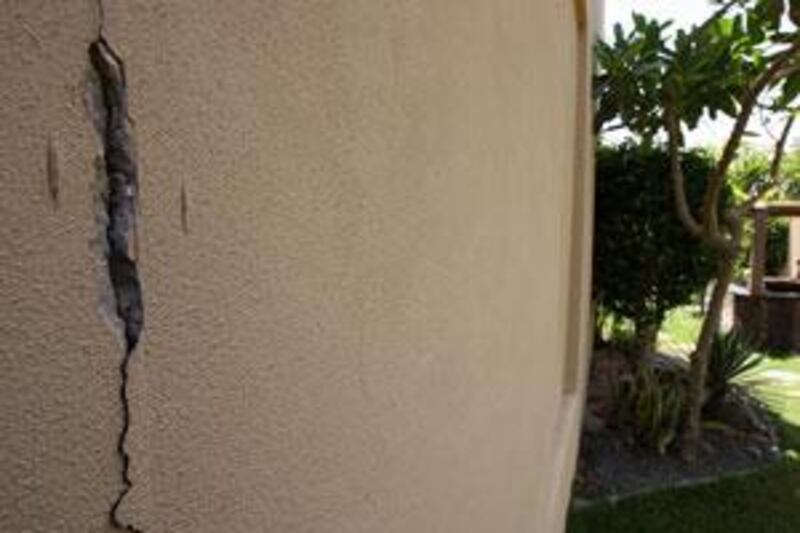DUBAI // Rama Hariharan wonders if her six-bedroom, Dh5 million (US$1.36m) dream home has begun succumbing to Mother Nature. Sections of her villa, adorned with custom-made furniture from Indonesia, leak profusely when it rains, leaving behind permanent water stains. The walls in the stairwell leading to the second floor are crisscrossed with small cracks. So too is the building's sun-baked facade.
"It's a lovely place," says Mrs Hariharan, 50, from India, as she gives a tour of her home in The Lakes. "But the construction quality, well, we're a bit disappointed." Mrs Hariharan suspects that her three-year-old freehold villa may be prematurely ageing. She is not alone. From The Greens and The Springs to The Lakes, homes in some of Dubai's neighbourhoods built in the early stages of the construction boom have crumbling facades, peeling paint and sagging roofs.
As the nicks and cracks grow, residents' concerns that their expenses will shoot up after their warranties - usually 10 years for a villa - expire are also on the rise. Some blame poor craftsmanship, a consequence of rapidly building thousands of villas and apartments during a short time. Others point to poor maintenance standards. Mother Nature has also played a part, the extreme heat taking years off the lives of buildings, construction experts say. Most, however, agree the phenomenon is an eyesore.
"We're not going to be living here forever, but you want a place that's a better quality of living," says Ahmed Ibrahim, 38, an Egyptian who lives with his family in a two-bedroom apartment in The Greens. The neglect "gives you the feeling that the area could be substandard, lower quality". He says his family enjoys the community-oriented design of The Greens, notably its swimming pools and barbecue pits.
But the ceiling in his apartment is crumbling away, and the development's common areas are dotted with sheets of peeling paint. From the outside of the complex, entrances and tan-stuccoed walls appear to be in need of some tender loving care. The culprit, Mr Ibrahim suspects, is neglect. "To be fair, the community here, the facilities, they're OK," he says. "But from 2005 to today is just four years - that's a short time to be experiencing these problems. When it comes to maintenance, to the quality of the buildings, there is room for improvement."
In an e-mailed statement, Emaar, the master developer of these residential complexes, said its properties were "delivered to the strictest quality standards with appropriate warranties in place". Residents with maintenance issues can call Emaar's hotline (800-EMAAR). "The normal signs of wear and tear in buildings," the statement said, "are easily remedied via the planned preventive maintenance programmes and other remedial measures that are conducted on an annual basis based on the urgency of the requirement."
But some residents, such as Nagham Hiraki, who with her husband rents a villa in The Springs 15, fear serious structural problems could cause certain parts of home to collapse. "The place isn't sound," says Mrs Hiraki, 47, a Syrian national who says she has had difficulty getting her landlord and property management companies to address problems in the three-bedroom home. "For a while, I was afraid that the garage was going to fall."
She estimates that she and her husband have paid Dh7,000 for repairs since they moved into their villa three years ago. That sum does not include a large crack that has gradually bisected her living room, or those that run along her stairwell. The problems have convinced her to move, possibly to the Jumeirah Beach Residence apartment towers at Dubai Marina. "I wouldn't want to live in this villa even if the rent was Dh10,000 a year," she says.
In nearby areas, for example The Springs Four, residents also complain about a broad range of issues, including sinking driveways, sagging garages and shoddy plumbing. In most cases, the structural integrity of villas and apartments in these residential areas is sound, says Martin Seaward-Case, a chartered surveyor who has observed construction in Dubai for the better part of a decade. If there are issues, he says, they will probably be localised to certain sections of these communities. Because construction was delegated to hundreds of subcontractors with varying experience, it is possible that clusters of villas could have inferior build quality.
Between 150 and 300 subcontractor companies were involved in the building of these areas, he says, "so you'll have sections that were just built better." The Springs contains about 4,700 homes, according to the property research firm Landmark Advisory. If anything, Mr Seaward-Case says, the "tenacious climate is more responsible than the actual build quality" for such issues as chipping paint and leaky roofs. Compared with structures in Europe, Dubai's harsh weather probably reduces a typical villa's life expectancy by a decade or more.
"Flat roofs are notoriously difficult to get right in this part of the world," he says. "It only rains for two days a year, so for the other 363 days of the year it has got to deal with this incredible thermal shock that happens to it during the day." According to some property-management firms, the country's unusually warm climate makes diligent upkeep all the more important. But this is often neglected, Mick Dalton, general manager of Abu Dhabi-based Marafeq Facilities Management, says. "With the harsh environment here, it needs to be done on a regular basis."
According to Adrian Quinn, chairman of Essential Community Management, unless the practice of property management in the UAE changes, it will be difficult to perform the necessary upkeep at residential areas. In his native Australia, management typically repairs nicks and scratches within 24 hours, he says. "The general philosophy here is that it sits there from month to month to month, until somebody says, 'Oh, we're going to repaint the building in another year, so let's just wait and do it then'. And slowly the building degrades because they don't have the budget to keep it looking new."
Not until residents can form homeowners' associations and vote on maintenance budgets and the awarding of maintenance contracts will the necessary incentives for proper property upkeep take hold, Mr Quinn says. Formal associations would grant them the authority to hire property management companies and collectively pool money to pay for expensive paint jobs and general property care. This would help relieve individuals of financial burdens, especially when home warranties expire.
"At the end of the day, for property, you must put money away for future maintenance," he says, "because the owner will get hit with the cost of major capital works of repainting the building, caulking, waterproofing, etc." hnaylor@thenational.ae * With additional reporting by Jessica Hume






